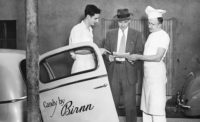
It was 100 years ago that Wrigley started out in a small London office, with an investment of just £2,000. Now, the company sells 725 million packs of gum each year and more than 90% of the gum chewed by Britons is made by the company.
“It’s so exciting to see how far we’ve come since we launched in the UK in 1911, from small beginnings in a single office in London to becoming the UK’s biggest seller of gum,” says Hamish Thomson, Wrigley’s UK general manager.” Despite all the political, cultural and technical changes, the core of what we do remains clear: to celebrate simple pleasures to brighten everyone’s day.”
The company, which now is a subsidiary of Mars, officially marked the 100-year milestone Oct. 19, and the celebration included taking a look back at its historical archives. Some of the most interesting tidbits included:
● Chewing gum really took off during the Second World War when American GIs living in Britain had Wrigley gum in their ration pack. Gum was then viewed as a glamorous, luxury item during the era of war-time austerity and rations. When rationing ended in the early 1950s, gum was one of the products people flocked to buy.
● On average Brits chew about 100 pieces of gum a year, 90% of which is made by Wrigley
● Americans are the biggest chewers, chewing an average of 182 sticks per year, with Brits following close behind (chewing 125 per year) ahead of the Germans (103), Russians (84), Chinese (20) and Indians (4).
● During the First World War, many soldiers chewed gum in the trenches to keep them focused.
● Due to shortages in electricity after the war, bicycles were used to generate electricity to keep the Wrigley production line going.
● In 1974, a packet of Wrigley’s gum became the first item ever to be bought using a laser barcode.
● With the help of 7,700 bulbs and 150 miles of wiring, Wrigley’s neon sign lit up Picadilly Circus for 40 years.
● Orbit was the first ever sugar-free chewing gum in the UK, launched in 1977. The development dramatically changed the landscape of the gum category. Mow, more than 90% of Wrigley chewing gums in the UK are sugar-free.
● In one day, the Plymouth factory produces more than 3 million packets of chewing gum.
● Chewing gum now comes with a scientific seal of approval as evidence shows chewing sugar-free gum regularly helps reduce tooth decay.
● Chewing gum is the most impulsively purchased category, with 71% purchased at the checkout.



